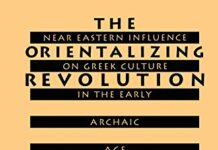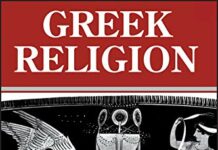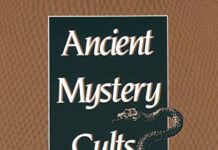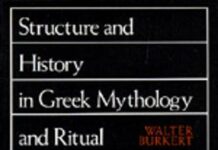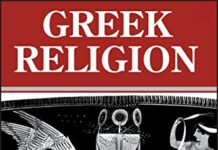
Ebook Info
- Published: 1972
- Number of pages: 544 pages
- Format: PDF
- File Size: 25.00 MB
- Authors: Walter Burkert
Description
For this first English edition of his distinguished study of Pythagoreanism, Weisheit und Wissenschajt: Studien zu Pythagoras, Philolaos, und Platon, Walter Burkert has carefully revised text and notes, taking account of additional literature on the subject which appeared between 1962 and 1969. By a thorough critical sifting of all the available evidence, the author lays a new foundation for the understanding of ancient Pythagoreanism and in particular of the relationship within it of “lore” and “science.” He shows that in the twilight zone when the Greeks were discovering the rational interpretation of the world and quantitative natural science, Pythagoras represented not the origin of the new, but the survival or revival of ancient, pre-scientific lore or wisdom, based on superhuman authority and expressed in ritual obligation.
User’s Reviews
Editorial Reviews: About the Author Walter Burkert was Professor Emeritus of Classics, University of Zurich.
Reviews from Amazon users which were colected at the time this book was published on the website:
⭐The book is in brand-new condition, but the cover was bound upside-down and backward, so when you open the front cover, you’re looking at the upside-down back page of the book.
⭐Burkert shows in this famous book that few of the discoveries assigned to the Pythagoreans by later writers were in fact made by the Pythagoreans. In particular, the Pythagoreans are not great innovators in music theory and mathematics and certainly were not competent at mathematical proof. Stories about the Pythagoreans seem to have been written after Plato, and instead of attributing the contents of Euclid’s Elements to the Pythagoreans, the contents should be attributed to Greek mathematicians generally and members of Plato’s Academy in particular.Burkert writes (p. 466, VI.4): “Number does, however, dominate the Pythagoreans’ general view of the world. In the relations among numbers they found the essence of musical harmony, and they knew or discovered a number of propositions that are mathematically significant. Is not this sedulous preoccupation with number precisely what we mean by mathematics? Do we not see here, in epitome, the origin and basis of natural science? To this question we must answer no.”The Pythagoreans did develop a numerology. The numbers 1,2,…,10 had characters assigned to them (1 was not in fact called a number but rather the monad and had its own associated stories), and then the various ways of combining numbers connected the characters of the combined numbers with the character of the output, for example 3 corresponds to male, 4 corresponds to female, and because these are sides of a triangle with hypotenuse 5, 5 corresponds to marriage. Like astrology, this is not scientific but it does encourage thinking about things that people might otherwise not care about; I assert that astrology at least until the Renaissance made us learn more than we would have without it, because few people bother thinking about stars merely because they enjoy celestial mechanics.V.1: “If neither the recognition of the simplest numerical laws of music nor physical theory on the nature of sound is exclusively Pythagorean, then there only remains, as that which, in Plato’s eyes, distinguished the Pythagoreans, the fundamental emphasis on number as such, which led to development of the mathematical theory of music quite beyond the requirements of actual practice.”Burkert’s book does what Mark Antony’s claims to do in Julius Caesar (III,ii), it buries Pythagoras rather than praises him. Instead of reading about the Pythagoreans generally, the best we can do is read the works of Carl Huffman on Philolaus,
⭐, and Archytas,
⭐, and the Greek musical writings edited by Andrew Barker,
⭐.
⭐The literature on Pythagoreanism is vast and often touched with madness. This book – to quote Jonathan Barnes (in THE PRESOCRATIC PHILOSOPHERS) ‘advanced [the study of Pythagoreanism] to a new level of sanity and scholarship’.It is definitely a book for scholars. One rather unfortunate result is the absence of translations for most of the Greek passages (with a few confusing exceptions when we are given only the translation). I have not seen the original German edition, so I do not know if the same is true there. Of course we need the Greek; but although most serious readers of a book like this will be able to cope, the absence rather lessens its (great) potential value for occasional reference, as well as slowing down students, perhaps, and many others whose Greek is a bit rusty and who do not want to be forced to keep a dictionary always on hand.Nevertheless, although there have been and will continue to be further studies of Pythagoras and Pythagoreanism since the date of this English edition (1970), it remains essential reading: as the author says he hopes to do, it ‘gives a full and perspicuous presentation of the evidence and thus will be useful even to those who are not inclined to draw the same conclusions’.
Keywords
Free Download Lore and Science in Ancient Pythagoreanism 1st Edition in PDF format
Lore and Science in Ancient Pythagoreanism 1st Edition PDF Free Download
Download Lore and Science in Ancient Pythagoreanism 1st Edition 1972 PDF Free
Lore and Science in Ancient Pythagoreanism 1st Edition 1972 PDF Free Download
Download Lore and Science in Ancient Pythagoreanism 1st Edition PDF
Free Download Ebook Lore and Science in Ancient Pythagoreanism 1st Edition
